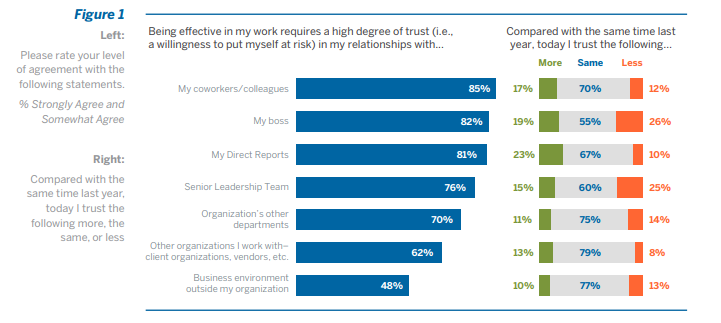Before coming to work for my current employer, I held a writing position at another company. I stayed there for five years, and when I finally decided to move on, it was tough. My coworkers were fantastic people. They worked hard; they were silly and supportive; I’ll never forget them. But, as dedicated as they were, and as much as we all enjoyed working together, there was a general exasperation about the conditions of the workplace.
The pay wasn’t great, but that was hardly the issue.
Most of the time, when the company saw turnover, it was because of one underlying factor: the employees felt they weren’t trusted or valued.
It didn’t matter how hard we worked or how much time and effort we put in, the company never rewarded or recognized the outcomes. Even worse, on the rare occasion trust and gratitude were shown, the exceptions were only for a selective few, usually those most favored by upper management.
 Source: Interaction Associates Building Workplace Trust Trends & High Performance, 2014/15.
Source: Interaction Associates Building Workplace Trust Trends & High Performance, 2014/15. Here’s a very specific example that still blows my mind: A long standing employee in a management position had a child. She spent years building the most successful department in the company and was an expert in her field. When she returned from maternity leave, she asked for the option to work from home.
It was denied.
Why? Because management didn’t “believe” people could be successful working from home. Without any proof that this woman would confirm their fears, and without even a trial period of work-from-home freedom, they inadvertently pushed out the most lucrative asset they had. She quit almost immediately.
It was apparent they did not trust her — or anyone for that matter.
The concept of trust in the workplace may seem arbitrary to some, but it is a very serious make-or-break component for productivity, employee retention, and engagement.
When your boss utters the phrase “I don’t need to see this again; I trust your judgement”, it may seem insignificant to him, but as an employee, it means everything.
In fact, findings of a Harvard study on the neurological connection between trust, leadership, and organizational performance, proved that trust is a bigger factor than any of us may have ever realized.
The study found that people who felt trusted at work were 50% more productive, took 13% fewer sick days, were 76% more engaged, and displayed less stress and burnout than those whose companies were considered low-trust. In addition, researchers discovered a direct correlation between the brain’s production of oxytocin and the level of trust a person felt in a given situation.
Another study by Stanford looked at the productivity and happiness of people who work from home, and the results were surprising. This is a hotly contested subject, but more companies are getting on board as employees demand the option.
According to the results of Stanford’s two-year study, work-from-home employees were not only happier, but more productive than their commuting counterparts. They took fewer sick days, less time off, were less distracted, and took shorter breaks. Not to mention the fact that they decreased their carbon emissions and company costs for brick-and-mortar workspaces.
What Makes People Feel Trusted?
A 2014 study on building workplace trust cited these three factors as the primary reasons people trusted one another in the workplace:
• Consistency, predictability, quality of work
• Confidence that both parties are working to achieve shared goals
• Expectations associated with a person’s role in the company
The study states that, “Organizations that place considerably more weight on these three elements are more likely to be High Performing Organizations with regard to profit (HPPOs).”.
Trust Benefits Everyone
- It empowers employees to feel independent and valued
- It boosts productivity and supports employee retention
- It makes it 2.5x more likely that the organization will be high-performing
- It helps employees feel satisfied with their jobs, even without financial incentives
- It adds value to company culture and encourages transparency
- It decreases stress and hostility in the workplace
- It builds teamwork and collaboration by creating a supportive and safe space to share ideas
- It’s great for morale and loyalty
Tips for Encouraging Trust in the Workplace
- Don’t micromanage! – Show employees you trust them by letting them manage their own time and projects. If they fail to meet standards, guide them and offer constructive criticism before turning to a micromanagement approach.
- Be open to new ideas. – Just because something is a “policy” doesn’t mean it can never change. Be willing to hear employees’ opinions and test out trial periods for work-from-home, summer hours, different project management styles, etc. Give them a chance to prove themselves.
- Find the weaknesses. – Is there an innate lack of trust anywhere? What does it stem from? Find the weakest areas and work on them with employees. If trust was lost, learn why. Then, brainstorm collaboratively to find solutions.
- Be consistent. Be the change. – It’s just science! As human beings, we notice and respond to patterns. Prove your commitment to building trust by keeping your word and following through. Knowing you can be depended on helps employees feel more secure and encourages them to respond in kind.
- Hire for personality. – Passion and emotional maturity should be weighed just as heavily as the person’s job competence. It’s a complete package.